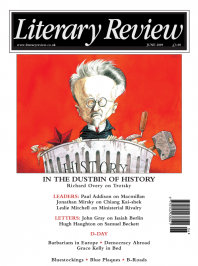John Keay
Urban Underbelly
Delhi: Adventures in a Megacity
By Sam Miller
Jonathan Cape 304pp £14.99
Quite a stir was caused in the 1970s when the Begum of Oudh – India’s equivalent of, say, the Duchess of Devonshire – was discovered living in straitened circumstances among the platform dwellers in New Delhi railway station. A gaunt and imposing figure ‘lost in thought’, according to The Hindu newspaper, ‘her dark sari rippling in the breeze and her hair falling just above her shoulders’, she mostly stood, hands on hips, observing the movement of people and trains with devastating indifference. This went on for years. Meals were taken in the station’s refreshment rooms, and when she tired of standing, the VIP lounge might be opened for her. At night she and her two children slept behind a screen of sheets under the watchful eyes of their Dobermann Pinschers. Nervous reporters came and went. The Begum didn’t budge. Nor did she speak often. Her presence was protest enough.
Admittedly, her claim to one of the most illustrious titles in the country was beset by niggling doubts: Oudh (or Awadh) had been annexed by the British in 1856, the Begum’s pedigree had been challenged by other members of the family, all princely titles had been abolished by

Sign Up to our newsletter
Receive free articles, highlights from the archive, news, details of prizes, and much more.@Lit_Review
Follow Literary Review on Twitter
Twitter Feed
Under its longest-serving editor, Graydon Carter, Vanity Fair was that rare thing – a New York society magazine that published serious journalism.
@PeterPeteryork looks at what Carter got right.
Peter York - Deluxe Editions
Peter York: Deluxe Editions - When the Going Was Good: An Editor’s Adventures During the Last Golden Age of Magazines by Graydon Carter
literaryreview.co.uk
Henry James returned to America in 1904 with three objectives: to see his brother William, to deliver a series of lectures on Balzac, and to gather material for a pair of books about modern America.
Peter Rose follows James out west.
Peter Rose - The Restless Analyst
Peter Rose: The Restless Analyst - Henry James Comes Home: Rediscovering America in the Gilded Age by Peter Brooks...
literaryreview.co.uk
Vladimir Putin served his apprenticeship in the KGB toward the end of the Cold War, a period during which Western societies were infiltrated by so-called 'illegals'.
Piers Brendon examines how the culture of Soviet spycraft shaped his thinking.
Piers Brendon - Tinker, Tailor, Sleeper, Troll
Piers Brendon: Tinker, Tailor, Sleeper, Troll - The Illegals: Russia’s Most Audacious Spies and the Plot to Infiltrate the West by Shaun Walker
literaryreview.co.uk